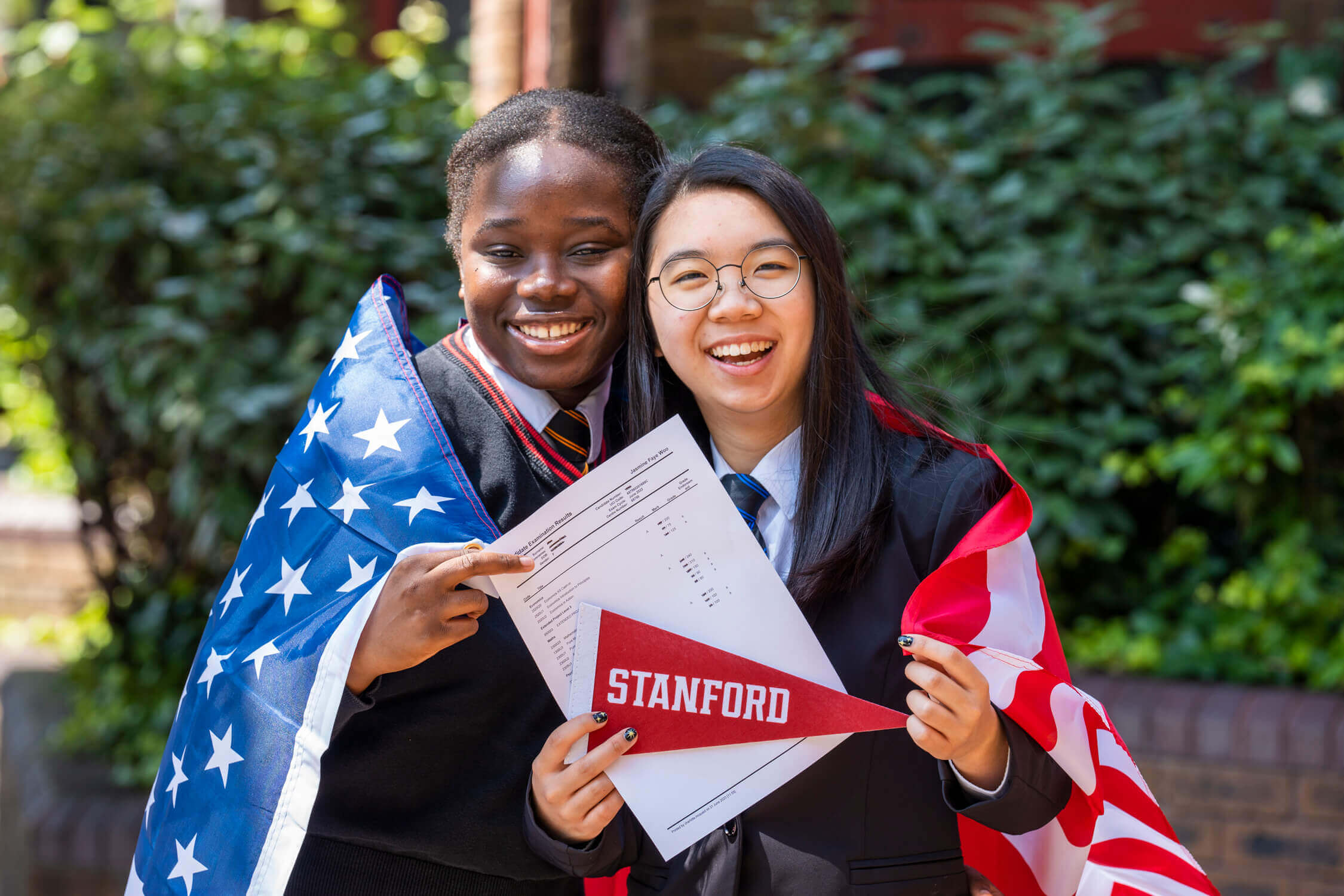In recent years, a significant trend has emerged in the educational landscape: an increasing number of international students studying at day and boarding schools in the UK are opting to pursue higher education at US universities. This shift in preference highlights the exceptional opportunities and advantages in the US, enticing ambitious young minds across the Atlantic. However, are there particular courses more suited to US universities and is cost a significant factor? Let’s explore this phenomenon.
The appeal of US universities
1) Tailored education for diverse interests
One significant reason behind the growing preference for US universities among international students is their flexibility in academic pursuits. Hayley Bendle, Head of Careers at Cardiff Sixth Form College, feels that US universities appeal to students with diverse interests. “Whether students’ interests lie in the sciences, humanities, engineering, arts, or business, American institutions offer comprehensive curricula, ensuring students can tailor their education to their unique career aspirations,” she said. The flexibility to explore inter-disciplinary fields, combined with world-class faculty and cutting-edge research facilities, provides an unmatched educational experience for some students.
Milly Wong, who joined Cardiff Sixth Form College to study GCSEs followed by A Levels, has just gained a place at Stanford University to learn Mechanical Engineering and Sustainability. “For me, it was all about flexibility as you don’t have to decide on your major until the last term of your second year,” she said.
2) Embracing interdisciplinary fields
Universities in the US foster an environment that encourages students to explore interdisciplinary fields. Milly points out, “I can pick whatever I am interested in. Although I will do maths and physics as core subjects, I can combine them with modules in international relations, for example, as I have many interests. I have been part of the Robotics Team at Cardiff and the NASA Club, but I am also a keen debater and represented Wales in the World Schools Debating Championships. I am also a member of Cardiff Production House making videos, enjoy Model United Nations and am Editor of the STEM Magazine, so I believe these aspects, combined with academic results, made Stanford interested in my application.”
3) Holistic education and personality development
US universities go beyond traditional classroom learning by strongly emphasising holistic education and personality development. Tolu, a US citizen who studied in a UK school, has a place at MIT to study Electrical and Energy Engineering. She feels that her university is looking for authenticity. “MIT is about work-life balance,” she said. “I really enjoy studying, but I spend my spare time walking with friends and relaxing, and I am very keen on giving back to society. I have volunteered for the Lattice Club, raising money for women and children displaced by Boko Haram, raised money for Noah’s Arc charity and want to bring my skills back to Nigeria to work on sustainability projects to improve lives.”
4) Global rankings and recognition
Tom Arrand, Principal of Cardiff Sixth Form College, points out that global rankings and the international recognition of US universities play a crucial role in attracting international students. “American universities have long held a reputation for academic excellence and global recognition, with the Ivy League in particular synonymous with innovation and groundbreaking research. We have students this year going to New York University, UCLA, the University of California, as well as MIT and Stanford University, to study subjects as wide-reaching as computer science, creative arts, economics and engineering, and our students are extremely ambitious. They want access to renowned scholars, industry leaders and like-minded peers from around the world to help them open doors to career opportunities within a global, multicultural environment.”
5) Strong industry connections
US universities maintain strong ties with industries, businesses, and organisations, offering abundant internships, research collaborations, and networking opportunities. This exposure to the dynamic job market and industry connections with leaders often translate into promising career prospects and increased employability upon graduation. “We have recognised the need for our students to gain work placements, develop career-based skills, undertake research and network right from the school level,” said Tom Arrand. “Milly, for example, worked with engineers from Network Rail to discover why cracks were appearing in the Severn Tunnel, and Tolu undertook work placement at an oil and gas company.
Factors to consider while choosing the US over the UK
1) Cost considerations
While US universities offer numerous advantages, cost can be a significant factor for international students. They typically have higher tuition fees for international students compared to UK institutions. Tuition fees in the US can range from $20,000 to $50,000 per annum, whereas UK institutions offer a range of £10,000 to £38,000 per annum. Both countries offer scholarships and financial aid to support international students, and part-time work options can help offset living expenses.
2) Finding the right ‘fit’
“When looking at US universities as a pathway, finding the right ‘fit’ is essential,” says Hayley Bendle. “Students need to prove to the universities that they are what they are looking for, that they have a broad range of experiences to prove this and articulate this both in writing and verbally. We help our students significantly with self-reflection, research with them the kinds of universities that match their needs and aspirations and consider breadth of learning alongside excellent academic results.”
3) Course duration
Undergraduate courses in the US take four years. Depending on your major in the UK, you can complete your undergraduate studies within three years. This further cuts costs by eliminating the tuition fee for an additional year. It also propels you into the job market sooner, enabling you to gather a year’s worth of experience compared to someone still studying in the US.
4) Specialised degree programmes
The UK remains popular for students pursuing specialised degree programs such as Law and Medicine. The UK offers five or six-year programs that combine theoretical knowledge with clinical training, making them more practical for these fields. The UK excels in providing rigorous medical and legal education standards while keeping funding costs relatively low, ensuring it remains a global leader in these areas.
Several factors drive the growing trend of international students favouring US universities, and schools in the UK are well-known for facilitating entry into selective universities like Ivy League colleges. However, students must carefully consider cost, finding the right fit, course duration, and specialised degree programmes before making any decisions. You can read blogs by The Red Pen on US or UK: Which is Better for Undergraduate Studies and UK Boarding School Admissions: Everything You Need to Know.
Please get in touch for more information on selecting a country for undergraduate studies or a boarding school education in the UK.
Henrietta Lightwood is Global Director Marketing and Student Recruitment at Dukes Education, a family of schools brought together to give children the foundations for an extraordinary life through education.




